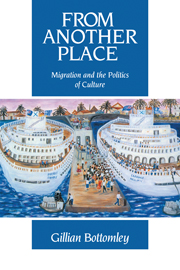Book contents
- Frontmatter
- Contents
- Preface and acknowledgements
- Part I Migration studies and the problem of culture
- Chapter 1 Migrations and cultural analyses: a point of departure
- Chapter 2 Comparative studies of migration, ethnicity, ‘race’ and culture in the U.S.A. and Britain
- Chapter 3 Traditions, structures and culture as process
- Part II Practising cultures
- Part III Constructing identities: gender, class, and ethnos
- Bibliography
- Index
Chapter 3 - Traditions, structures and culture as process
Published online by Cambridge University Press: 05 November 2011
- Frontmatter
- Contents
- Preface and acknowledgements
- Part I Migration studies and the problem of culture
- Chapter 1 Migrations and cultural analyses: a point of departure
- Chapter 2 Comparative studies of migration, ethnicity, ‘race’ and culture in the U.S.A. and Britain
- Chapter 3 Traditions, structures and culture as process
- Part II Practising cultures
- Part III Constructing identities: gender, class, and ethnos
- Bibliography
- Index
Summary
… cultural sets of practices and ideas (are) put into play by determinate human actors under determinate circumstances.
In the course of action, these cultural sets are forever assembled, dismantled and reassembled, conveying in variable accents the divergent paths of groups and classes.
Wolf, 1982, pp.390–1In this chapter, I will develop some of the interconnections between migration and culture, keeping in mind the themes introduced in the first two chapters. One of the problems of discussing cultural practices within this context is that students of migration, especially, have tended to assume separate and often opposed perspectives that can loosely be described as either ‘culturalist’ or ‘structuralist’ (usually ‘Marxist’, in the latter case). Ethnicity, as a concept, and culture, by association, have been regarded as the province of the former category. For example, Miles (1982) has carefully analysed ‘the ethnic relations problematic’ and criticised its emphasis on cultural differentiation as the primary focus of interest. Such an emphasis fails to identify class divisions within the culturally distinct groups or their interconnection with the wider social formation. He argues that it is important to recognise that members of ethnic groups also have positions in production, and therefore class relations (see esp. pp.67–71).
Nevertheless, Miles sees the significance of the ethnic relations model (a) in pointing out that ethnicity, rather than phenotypical characteristics, can be a source of conflict; (b) in seeing migrants as agents and not simply passive victims; and (c) in demonstrating the connections between economic and political conditions in countries of origin and those in immigrant-receiving countries.
- Type
- Chapter
- Information
- From Another PlaceMigration and the Politics of Culture, pp. 36 - 54Publisher: Cambridge University PressPrint publication year: 1992



